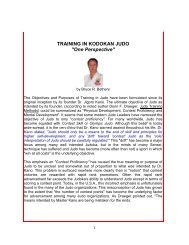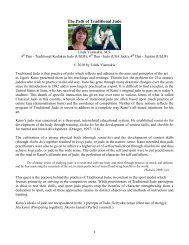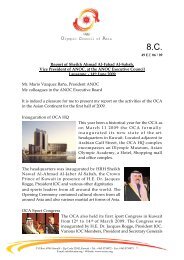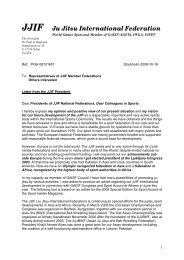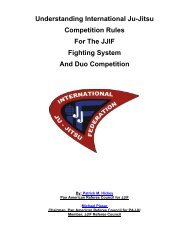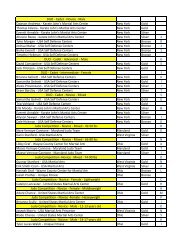Rediscovering Kodokan Judo - United States Ju-Jitsu Federation
Rediscovering Kodokan Judo - United States Ju-Jitsu Federation
Rediscovering Kodokan Judo - United States Ju-Jitsu Federation
You also want an ePaper? Increase the reach of your titles
YUMPU automatically turns print PDFs into web optimized ePapers that Google loves.
<strong>Rediscovering</strong> <strong>Kodokan</strong> <strong><strong>Ju</strong>do</strong><br />
A direct consequence of this is that the governing bodies focus their investment only on the handful<br />
of elite athletes who have the potential to be World or Olympic medallists.<br />
For the majority of judoka, judo is now just about medals and prizes and most focus their attention<br />
on only the small subset of judo that is relevant to the sports competition context - thereby ignoring<br />
the other elements of judo such as atemi waza (striking techniques).<br />
It is also a matter of concern that most judo governing bodies have biased overwhelmingly their<br />
rank promotion (i.e. grading) structures towards accelerating the advancement in grade of those<br />
who are successful in competition, with often only lip service being plaid to the breadth and depth<br />
of an individual’s technical judo knowledge. Bethers [3] writes:<br />
This emphasis on "Contest Proficiency" has caused the true meaning or purpose of <strong><strong>Ju</strong>do</strong> to<br />
be unclear and somewhat out of proportion to what was intended by Dr. Kano. This<br />
problem is surfaced nowhere more clearly than in "notion" that contest victories are<br />
rewarded with rapid rank promotions.<br />
Currently there is little prospect of advancement in grade for those who (through age, physical<br />
condition or personal preference) wish to practise judo as an art as opposed to a sport. This is of<br />
course with the notable exception of the promotions that governing body officials and<br />
administrators seem to receive as a matter of course. The risk one runs with such a policy is a<br />
resultant judo hierarchy that is both one-dimensional in its knowledge and skewed in its priorities.<br />
It is especially disappointing that those judoka who prefer to focus their study on the more<br />
traditional and technical aspects of judo (e.g. kata) have become tagged with the label recreational<br />
players - with an implication that they are somehow inferior to contest players and not worthy of<br />
attention and recognition.<br />
The Turning Tide<br />
There is a significant emerging awareness that sport aspects of judo have overrun what judo is all<br />
about. Yasuhiro Yamashita, arguably the greatest judo competitor the world has ever known 2<br />
writes [4]:<br />
Today there is too much of a focus on creating "champions". There is more to learn in <strong><strong>Ju</strong>do</strong><br />
then just being champion only. I would like to teach the real meaning and spirit of <strong><strong>Ju</strong>do</strong>…<br />
In formulating this view Yamashita recalls the words and influence of his mentor, Dr Shigeyoshi<br />
Matsumae [4]:<br />
“As an athlete, the goal of becoming champion is not everything in life. There are more<br />
important aspects of sports such as the diffusion of the educational aspects of judo, making<br />
many friends through judo and making a contribution to world peace through sport and<br />
judo.”<br />
2 Between October 1977 and his retirement in April 1985 Yasuhiro Yamashita won 203 consecutive judo matches. He<br />
won a gold medal at the Los Angeles Olympics and was a three-time World <strong><strong>Ju</strong>do</strong> Champion.<br />
2




